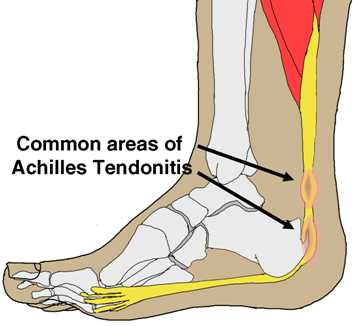Achilles tendonitis is a common injury in the running community. It is an inflammatory ailment that leads to swelling, pain and tissue damage. It results from repetitive strain, which in turn makes it more susceptible to tearing or even rupturing.
The Achilles tendon attaches to the heel of the foot, as do the posterior muscles of the leg, which help to plantar flex the foot (point the toes down). It is responsible for providing the push that drives the foot down and forward when walking, running, and jumping. All in all, it generates a lot of tension and absorbs a lot of force. It‘s involved in most actions of the lower extremity and becomes more susceptible to tendonitis when engaging in sports, where it is under a constant, repetitive load.
A further danger exists for triathletes, when making the transition from swimming to running. The tendon has been in a shortened position during the swim and then has to elongate during the run. Without stretching the tendon beforehand, a strain on the fibers or even a tear can occur because the fibers are “accustomed” to the shortened position.
Prevention plays a major role in dealing with tendonitis. Proper running form, appropriate footwear and a good flexibility program are important areas to start with. Massage, ART, and acupuncture are all treatments that not only help to restore flexibility once tendonitis has developed, but are viable ways to prevent it as well.
Tendonitis rarely goes away on its own. Usually, the longer you have tendonitis the longer you will need treatment before you see improvements. Massage is an excellent way to maintain the integrity of the muscles by increasing circulation (bringing nutrients to the area and flushing out metabolites) and reducing tension on the fibres. ART works quickly to break down adhesions and scar tissue that form with tendonitis, helping to restore full range of motion. Acupuncture is another effective way of reducing inflammation and pain.


